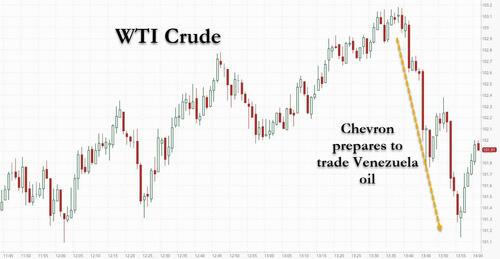Oil Drops On Report Chevron Set To Start Trading Venezuelan Oil Once US Relaxes Sanctions
Oil, which earlier tumbled below $100 (for WTI) amid speculation that a Ukraine ceasefire is imminent (it isn’t) and that Chinese oil demand will collapse due to the Shenzhen lockdown (it won’t), dropped over a dollar moments ago when Reuters reported that a new source of oil may be about to emerge: Venezuela, which like Russia, is currently sanctioned by the US (but not for long).
According to Reuters, which cites “three people familiar with the situation”, Chevron is preparing to take operating control of its joint ventures in Venezuela if Washington relaxes sanctions on Caracas to boost crude supplies after banning Russia’s oil imports.
The US oil major has begun assembling a trading team to market oil from Venezuela as a first step, and if U.S. approvals are received, Chevron aims to expand its role in the four joint ventures it shares with state-run company PDVSA.
The Biden admin – which is desperate to procure oil from any source, even Venezuela, if it means lower gas prices – has said that any new authorization will depend on whether Venezuelan President Nicolas Maduro takes further political steps, such as releasing more jailed Americans and setting a firm date for resuming negotiations with the Venezuelan opposition.
While a date has not been set for issuing the authorization, Chevron has begun preparations for employees to get Venezuelan visas in Aruba, ready to head to Caracas if the U.S. Treasury eases restrictions.
Meanwhile, Reuters adds that Chevron’s proposed moves could revitalize Venezuela’s oil output and exports after years of underinvestment and sanctions shrank it to about 755,000 barrels per day (bpd) last month from 2.3 million bpd in 2016. Chevron’s joint ventures with PDVSA had produced about 200,000 bpd before U.S. sanctions and lack of financing cut their output.
Chevron aims to begin moving Venezuelan oil to refineries as soon as next month. Last week’s U.S. ban on Russian imports allows oil under existing contracts to arrive in the country through April 22.
“Since Venezuelan barrels were banned in the United States in 2019, and Colombia and Mexico reduced key exports to the United States, Russian barrels have been feeding the Gulf refiners,” said one person involved in the talks.
It is unclear how quickly any new barrels could reach the market: Chevron has vastly reduced its presence in Venezuela after Washington tightened sanctions on Venezuela in 2020. For years, Chevron and other PDVSA venture partners have requested more operating oversight.
Meanwhile, another Reuters source said that the United States is drafting a new license that would allow Chevron to assume a more active role in Venezuela. Washington is considering similar oil-for-debt authorizations for Spain’s Repsol and Italy’s Eni SpA. They collectively are owed billions of dollars by their Venezuela joint ventures.
As previously reproted, Washington quietly restarted diplomatic engagement with Venezuela, a close ally of Russia, earlier this month. Last week, Maduro released two jailed Americans, and Washington has insisted others also be freed. Maduro has expressed a willingness to resume a dialog with the opposition after he suspended talks in Mexico in October. U.S. officials want a firm commitment to discussing free elections.
On Sunday, U.S. national security adviser Jake Sullivan told NBC any sanctions relief for Venezuela must be tied to “concrete steps” by Maduro.
The Biden administration had not previously made Venezuela a foreign policy priority. That changed when Middle East and U.S. shale producers would not boost their crude supplies when the White House asked them to do so after the Ukraine invasion.
Congressional Republicans and even some of Biden’s fellow Democrats such as U.S. Senator Bob Menendez have opposed any deal that would benefit the socialist president. Washington condemned Maduro’s 2018 re-election as a sham.
The United States imported 670,000 barrels per day (bpd) of Russian oil and fuel last year. One of the few countries in a position to replace those imports is Venezuela. Before sanctions, its oil went mainly to U.S. Gulf Coast refiners.
Chevron has held parallel talks with PDVSA to expand its joint ventures’ governance. Any agreements likely would be temporary unless Venezuela enacts deep reforms of its oil legislation, which require PDVSA to be the majority stakeholder in any joint venture. While PDVSA President Asdrubal Chavez supports an expanded operating role for Chevron, some Venezuelan top officials resist the change.
Venezuela holds about 300 billion barrels of oil reserves, the world’s largest, but has not been able to hit its production targets due to underinvestment, poor maintenance, lack of supplies and U.S. sanctions.
Tyler Durden
Mon, 03/14/2022 – 14:02
via ZeroHedge News https://ift.tt/X3g2eAz Tyler Durden
